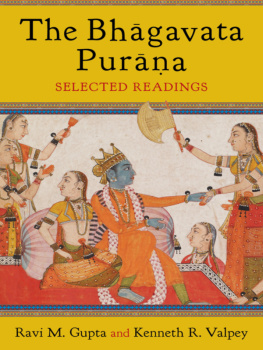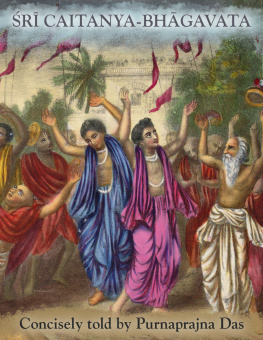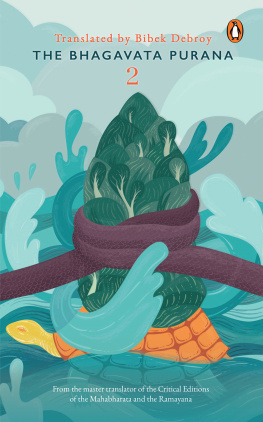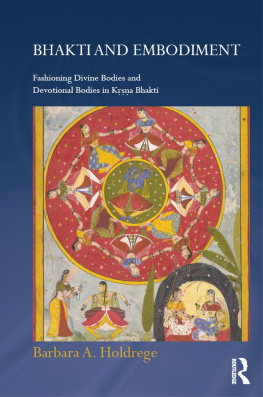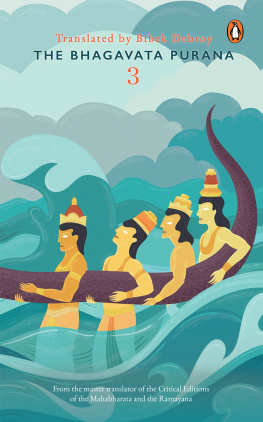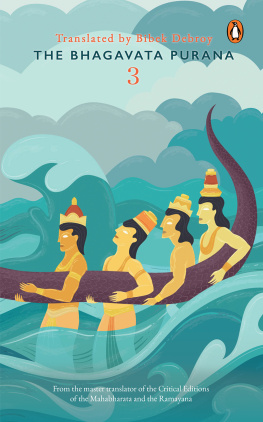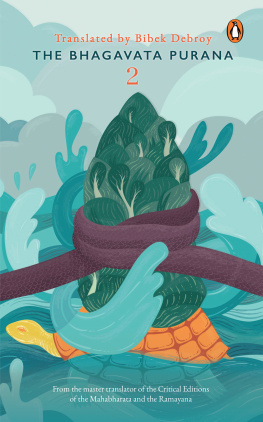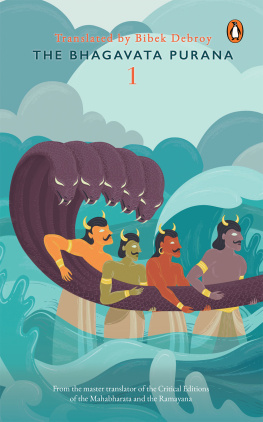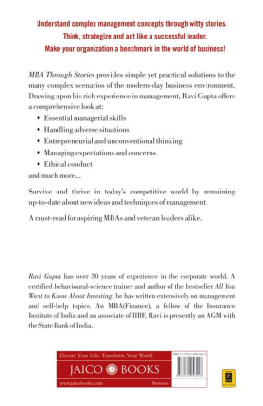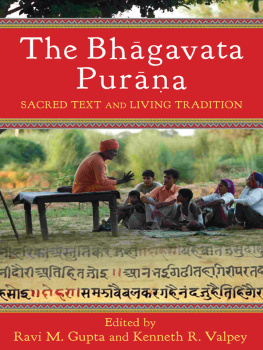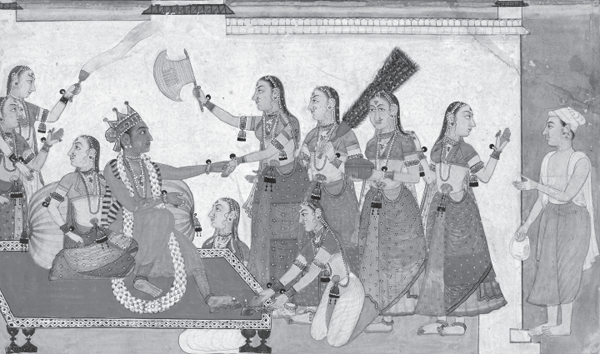Table of Contents
THE BHGAVATA PURA
THE BHGAVATA PURA
Selected Readings
Ravi M. Gupta and Kenneth R. Valpey
COLUMBIA UNIVERSITY PRESS
New York
Columbia University Press
Publishers Since 1893
New York Chichester, West Sussex
cup.columbia.edu
Copyright 2017 Columbia University Press
All rights reserved
E-ISBN 978-0-231-54234-0
Library of Congress Cataloging-in-Publication Data
Names: Gupta, Ravi M. (Ravi Mohan), 1982 editor. | Valpey, Kenneth Russell, 1950 editor.
Title: The Bhgavata Pura : selected translations / Edited by Ravi M. Gupta and Kenneth R. Valpey.
Description: New York : Columbia University Press, 2016. | Includes bibliographical references and index. | Translated from Sanskrit.
Identifiers: LCCN 2016000353 (print) | LCCN 2016040118 (ebook) | ISBN 9780231169004 (cloth : alk. paper) | ISBN 9780231169011 (pbk.) | ISBN 9780231542340 (electronic)
Classification: LCC BL1140.4.B434 E5 2016 (print) | LCC BL1140.4.B434 (ebook) | DDC 294.5/925dc23
LC record available at https://lccn.loc.gov/2016000353
A Columbia University Press E-book.
CUP would be pleased to hear about your reading experience with this e-book at .
COVER DESIGN: Noah Arlow
COVER IMAGE AND FRONTISPIECE: Detail from Krishna Welcoming Sudama, from a Bhagavata Purana Manuscript. Color and gold on paper, c. 1700, Pahari School. Freer Gallery of Art and Arthur M. Sackler Gallery, Smithsonian Institution: PurchaseCharles Lang Freer Endowment, F1930.25
To Shaunaka and Keshava,
and all our friends at the Oxford Centre for Hindu Studies
sat prasagn mama vrya-savido
bhavanti ht-kara-rasyan kath
taj-joad v apavarga-vartmani
raddh ratir bhaktir anukramiyati
In the company of good souls,
discourses about my prowess
become the elixir narratives for ear and heart.
By delighting in them,
confidence, attraction, and devotion will quickly follow
for one on the path of freedom.
BHGAVATA PURA 3.25.25 (KAPILA TO DEVAHTI)
CONTENTS
C. MACKENZIE BROWN, JENNIE FARRIS RAILEY KING PROFESSOR OF RELIGION, TRINITY UNIVERSITY
The Bhgavata Pura is perhaps the most popular of all the great Hindu Purassacred dialogic narratives revealing ancient happenings that, for their followers, are relevant for todays living. Until very recent times, the Puras have not been as well known in the West as the four Vedas and their affiliated Upaniads, but the Puras surpass the latter two revelatory texts in terms of their everyday impact on religious practice. The various Puras are embraced by one or another school of Hinduism, such as the aivas, ktas, and Vaiavas. They provide the spiritual seekers in these schools with answers to what is real, what is false, and in light of what is real, what ideals to follow.
The Puras themselves at times make the claim that they are the equivalent of the Vedas, or a fifth Veda, but, unlike the Vedas, they are, in the strictest sense, open to all regardless of class, caste, or gender. The Bhgavata Pura makes precisely such a claim and promises to offer everyone the means for liberation from the suffering-infused round of birth and death. This ongoing round is the fundamental predicament of humankind assumed by the text and its followers. By reading and listening to the text, with its many stories of the cosmic and terrestrial exploits of Krishna, one can attain the liberating state of Krishna consciousness.
The Bhgavata Pura is one of the foremost sacred texts of the Gauya Vaiavas, founded by Caitanya Mahprabhu, the great sixteenth-century Bengali saint. An important contemporary branch of this group is the International Society of Krishna Consciousness (ISKCON), founded by Swami Bhaktivedanta Prabhupda in 1966 in New York. For these followers, what is real is Krishna, and the highest goal is to reflect and meditate constantly on Krishna and to perform his servicethat is, to develop total devotion, or bhakti, to Krishna.
The present volume by Ravi M. Gupta and Kenneth R. Valpey provides a useful introduction to the Bhgavata, discussing its relation to older sacred literature, especially the Vedas, Brahmastra, and Mahbhrata, its assimilation of various philosophical schools of thought such as the Skhya, Vednta, and Yoga, its rhetorical style and structure, and its major devotional themes. The heart of the volume is a translation of selected passages constituting approximately fifteen hundred of the Bhgavatas more than fourteen thousand verse couplets, with explanatory endnotes that often incorporate the interpretive insights of numerous commentators. The authors connect these translated passages with succinct summaries, offering a sense of the Bhgavata as a whole. Further, the volume provides four commentarial excursions that give a taste of the rich and complex commentarial tradition and its various, alternative interpretations of the text, drawing from the famous Advaitic commentary of rdhara Svm and other, more dualistic commentaries of the Vaiava theologians. A glossary assists the reader unfamiliar with basic Sanskrit terms.
It should be noted that there is a companion volume, a set of scholarly essays on the Bhgavata, edited by Gupta and Valpey, that provide in-depth analysis of significant issues in the Bhgavata that are of universal relevance, such as the problem of suffering and Gods alleged impartiality. This question, for instance, is raised in , 8:2829, for which explanatory notes are provided that give, among other things, Swami Bhaktivedantas interpretive resolution of the theodical problem by saying Gods grace is like the sun that shines on all, but some people prefer darknessthose who oppose service to Krishna. The notes make reference to an essay in the companion volume that deals more extensively with the Bhgavatas theodicy and concludes that Krishna sometimes, to favor his devotees, showers them with misfortune to turn their hearts toward him and away from the world. While the Bhgavatas perspective may not convince those who do not look forward to an afterlife, this volume and its companion make the text come alive, with issues that inspire reflection, if not always agreement.
The volume is clearly a work of scholarly dedication. Gupta and Valpey set for themselves the task of rendering an accessible yet academically sound translation, surely a difficult task for a work as expansive and complex as the Bhgavata Pura. The authors were well equipped to handle the task, both having received a doctoral degree from Oxford University in religious studies and completed their dissertations on aspects of Gauya Vaiavism. Gupta holds the Charles Redd Chair of Religious Studies at Utah State University, Logan. Valpey is a permanent research fellow for the Oxford Centre for Hindu Studies. So we may now ask, how well did they succeed in their scholarly and pedagogical tasks?

